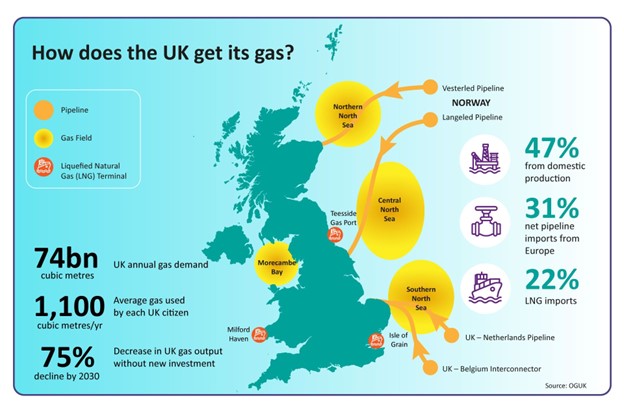
Newswire — The North Sea Transition Authority (NSTA) has announced the allocation of 31 new oil and gas licenses, marking a significant step towards reinforcing energy security in the UK, says Offshore Energies UK (OEUK).
OEUK heralds this move as crucial for bolstering confidence across various sectors, particularly amidst the nation’s expanding focus on wind, hydrogen, and carbon capture and storage initiatives.
Primarily targeting gas extraction from the southern North Sea, these licenses hold the potential to contribute substantially to powering and heating businesses and households within the next half-decade. By reducing reliance on carbon-intensive imports, the NSTA aims to curtail the nation’s carbon footprint while fostering an environment conducive to domestic energy transition and economic growth.
Rigorous environmental assessments preceded the offer of licenses in the third tranche of the NSTA’s 33rd licensing round, underlining the significance of this development for stakeholders throughout the industry and its extensive supply chains, which collectively support over 200,000 jobs across the UK.
With a total of 82 offers extended to 50 companies in this round, spanning 257 blocks and part-blocks, the licenses hold the potential to add an estimated 600 million barrels of oil equivalent (MMboe) up to 2060 or 545 MMboe by 2050.
David Whitehouse, CEO of Offshore Energies UK, emphasizes the multifaceted benefits of these new licenses, highlighting their role in securing domestic gas supplies, safeguarding employment, and facilitating the transition to low-carbon infrastructure within the UK. Whitehouse underscores the pivotal choices facing the nation in this election year, emphasizing the importance of nurturing homegrown energy initiatives to fortify energy security, spur economic progress, and preserve thousands of jobs across parliamentary constituencies.
OEUK CEO David Whitehouse said, “New oil and gas licenses benefit every sector in the UK. They will help to bring secure supplies of homegrown gas into our grid, reducing our reliance on more carbon intensive imports from overseas. These licenses will help to protect jobs and power and heat the nation’s firms and homes as we build the next generation of low carbon infrastructure here in the UK.
“In this general election year, we face a choice: we can build a homegrown energy transition and kickstart economic growth by backing our people, our offshore firms and our world class supply chain, or we can import even more energy and fail to grow our new wind, hydrogen and carbon capture industries. Our energy security, economic growth, and thousands of jobs in almost every parliamentary constituency up and down the UK are at stake.
“We all recognize that our energy mix must change, and our sector is ramping up renewables and accelerating the drive to net zero. But this journey will take time. Meanwhile our North Sea basin is naturally declining. We have over 280 oil and gas fields but by the end of the decade 180 of them will have stopped production. We need the churn of licenses for an orderly transition that supports jobs and communities across the country and meets our energy needs.”
With regards to the necessity and implications of expanding oil and gas production in UK waters, it’s crucial to note that the carbon footprint of domestic gas production is significantly lower than that of imported liquified natural gas. Therefore, the allocation of new licenses aims to mitigate the decline in UK supplies rather than increase production above current levels, aligning with the nation’s trajectory towards achieving net zero emissions by 2050.
Furthermore, concerns about the potential impact on energy sustainability are addressed by highlighting the rigorous environmental assessments conducted prior to offering these licenses. These assessments ensure that energy production activities adhere to strict environmental regulations, contributing to the responsible management of resources and minimizing ecological impacts.
As for the regulatory considerations surrounding licensing provisions, it’s emphasized that licensing is a standard practice within energy production regimes, encompassing activities ranging from initial exploration to eventual decommissioning. The UK’s oil and gas regime is characterized by robust regulation, with applicants subjected to stringent commercial, environmental, and health and safety standards.
This article was originally posted at sweetcrudereports.com
Be the first to comment